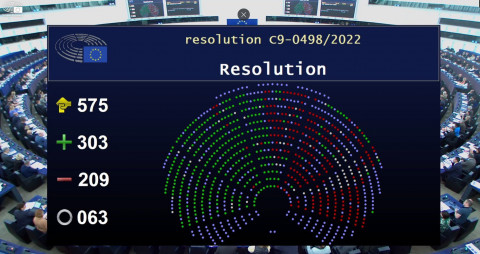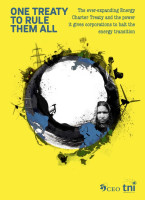The fight for the climate has been devastating and hope can feel scant. When climate movements score victories, they must be celebrated. On Thursday 24 November, the European Parliament passed a resolution that the reformed ECT is not aligned with the Paris Agreement or the EU Climate Law, opening the way for Europe to abandon the little-known Energy Charter Treaty (ECT). The many civil society organisations, campaigners and researchers who fought to expose the treaty must celebrate and be celebrated.
The ECT is a sort of all-risk insurance for foreign investors in the energy sector, allowing them to sue countries if they believe their existing or future profits have been negatively affected, providing a dangerous weapon for fossil fuel companies against governments that implement urgently needed measures to fight the climate crisis. In short, the ECT protects private profits over people and the urgency of acting in the face of climate change. The treaty was signed in the mid 1990s to protect EU capital in former soviet countries and to ensure EU access to energy sources. However, one of the biggest countries, Russia, never even signed the Treaty. Still, the Treaty is one of the biggest multilateral agreements today with 53 signatories including countries from Europe to Central Asia and the European Union as a whole.
So what happened?
Civil society groups, campaigners and researchers have worked relentlessly to make people aware of the treaty, to expose how it obstructs climate action – including under the Paris Agreement – and to push policy makers to reject the ECT and any half-attempts to reform it. Through public demonstrations and interventions in the media and parliament, the climate movement has shaken support for the ECT.
When Spain and the Netherlands – the birthplace of the ECT – signalled their intention to withdraw, the dominoes began to fall, with France, Germany, Slovenia and Luxembourg also following suit. This culminated with a vote on 24 November, where a majority with more than 100 votes difference chose to ditch the treaty. With this opinion now from the European Parliament the European Commission will find it very hard not to initiate the process towards a coordinated exit of the EU from the ECT.
Climate and trade campaigners can count this as another success, following in the footsteps of the campaigns against the TTIP and CETA trade and investment treaties. These campaigns saw a massive coming together of civil society groups all over Europe and first shone a light on the Investor-to-State-Dispute-Settlement (ISDS) system, which allows companies to sue governments outside national court systems for millions or even billions. That the Energy Charter Treaty already contained this controversial ISDS system before TTIP and CETA meant that it was a logical next target. But fighting to stop a new agreement is a different challenge to pushing for withdrawal from an old one.
Criticism of the ECT has ramped up exponentially, as attempts to modernize it have floundered. More than a million people across Europe and more than 400 organizations around the world have called for an exit from the Treaty. National political representatives and Members of the European Parliament have published critiques. Even the scientific community has spoken out on several occasions: more than 500 academics warned about the dangers of continuing to protect investments in fossil fuels in the face of increasing global temperature and increasingly deadly climate change. The IPCC itself described it, last April, in its Sixth Report as “a serious obstacle to climate change mitigation”.
At the end of 2020, Laurence Tubiana —one of the architects of the Paris Agreement— began to raise her voice on social media about the ECT as a liability to meaningful climate action.
Even as movements celebrate, they are ever mindful that the ECT has already cost Europe billions of euros of public money in compensation for ECT cases countries have lost. With some emblematic cases such as the energy giant RWE suing the Netherlands for 1.4 billions over their plans to phase out coal by 2030.
The road so far has not been easy, but the earthquake around the ECT is a victory for social movements, environmental organizations and the campaigners, who have persevered for years in the fight for another type of international economic relations, where the rights of people and the planet are above the interests of transnational corporations. It’s a victory for the climate, the environment and social welfare. In this victory, climate movements have demonstrated something powerful once again: even as the way forward looks dark and fraught with obstacles, they can and will continue to fight and score victories – because there is no other choice.
However, every victory must be defended, and the next step is to ensure that Europe abandons the treaty altogether, and does not instead try to bring another version of a modernised treaty onto the table. So even as we celebrate, the struggle continues.





